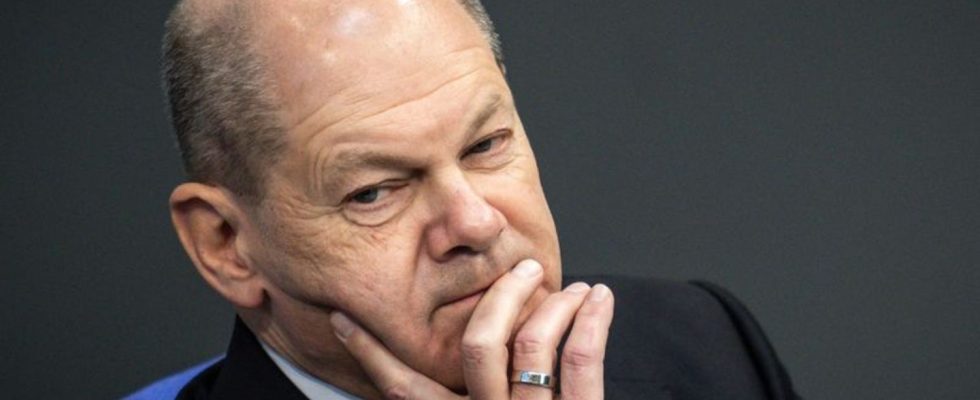This Tuesday, the chancellor will meet his ministers for half-time consultations at Meseberg Castle. Shortly before, there is still a crunch between the SPD, the Greens and the FDP.
Shortly before the cabinet meeting at Schloss Meseberg, Chancellor Olaf Scholz (SPD) is trying to be more united in view of the ongoing disputes in the traffic light coalition. When asked whether mutual legal blockades would continue, he told Mediengruppe Bayern: “I can only warn against that.”
Scholz wants to settle the dispute over basic child security quickly. “The federal government will clarify by next week how the basic child security system will be structured in concrete terms,” he added. SPD leader Saskia Esken called on the coalition to be more relaxed.
The government made many far-reaching decisions that ensured more speed and modernization, Scholz told the newspapers of the Bavarian media group (“Passauer Neue Presse”, “Mittelbayerische Zeitung”, “Donaukurier”). “We should focus more on highlighting the successes of government work and having the necessary discussions about our plans internally.”
look at the economy
On Tuesday, Scholz and his 16 ministers will meet for their fifth cabinet retreat in the federal government’s guest house at Schloss Meseberg north of Berlin. Even before the summer break, the coalition partners had repeatedly argued, particularly violently about the so-called heating law.
Scholz spoke out against the impression that Germany was developing into the “sick man of Europe” because of its weak economic growth. He told the Bayern media group: “We must not badmouth Germany as a business location. Our country continues to have good economic prospects.”
Because Germany is so successful in exports, it feels a weakening of the global economy particularly strongly. “But the reverse is also true: if the global economy picks up again, we will also benefit more.”
SPD leader Esken: People don’t want a fight
Esken told the German Press Agency: “It would be good if we could also clarify internally the questions that we need to discuss more.” The arguments must also be exchanged in public, because the population must have the opportunity to form an opinion.
“But that doesn’t have to be an argument. People don’t want that, and it usually doesn’t get things moving,” emphasized Esken. “So it would be nice if things were a little more relaxed after the summer break.”
Dispute about basic child security before the agreement?
On Friday, high-level talks about basic child security were postponed, as the dpa learned from government circles. They should now be completed by the start of the exam on Tuesday. The dispute escalated in the first cabinet meeting after the summer break – Paus blocked Linder’s law for more economic growth because she did not yet see the financing of her project secured.
Scholz now said about the structure of basic child security: “At the same time, Germany needs a nationwide range of crèches and daycare centers, if possible without fees. We are supporting the federal states in a federal-state program so that this progresses.”
Bushman warns Paus
Justice Minister Marco Buschmann (FDP) urged Paus to give in in the dispute over the Growth Opportunities Act. “In our economic situation, we cannot afford any further delay,” he told the “Welt am Sonntag”.
Lindner’s project provides for around 50 tax policy measures that are intended to relieve the German economy by around 6.5 billion euros a year. After the frosty economic winter, the German economy did not gain momentum in the spring either. Gross domestic product stagnated in the second quarter compared to the previous quarter.
Buschmann advised the coalition members to abstain verbally: “I would recommend us as a coalition to complain less about each other and to work harder on problem solving,” he said. “It’s better for your own nerves and for the country as a whole.”
Chancellor remains skeptical about industrial electricity price
Scholz remains skeptical about electricity price subsidies for industry. “We are united by the goal that electricity prices have to go down. In order to permanently subsidize the electricity price, we not only lack the money, but also the legal options,” he told the Bayern media group.
“That’s why we are primarily focusing on a faster expansion of wind power and solar energy.” As a result, the price of electricity would be lower in the medium term than in countries that rely on nuclear power.
SPD leader Lars Klingbeil had clearly spoken out in favor of an industrial electricity price. On Thursday, the executive SPD parliamentary group decided on a concept for an industrial electricity price of five cents per kilowatt hour, initially limited to five years.
This Monday, the entire parliamentary group is to decide on this in the presence of the chancellor at a meeting in Wiesbaden. In the traffic light coalition, the FDP is against state aid to lower electricity prices for certain companies, the Greens are in favor.

